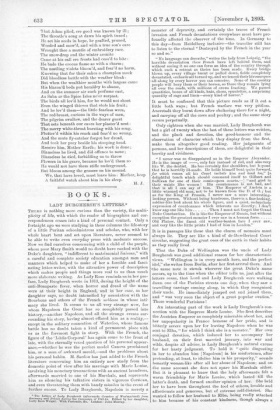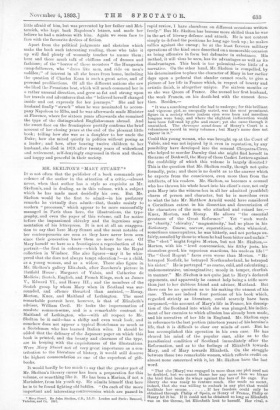BOOKS.
LADY BURGHERSH'S LETTERS.*
THERE is nothing more curious than the variety, the multi- plicity of life, with which the reader of biographies and cor- respondences comes into a kind of personal contact. Only a fortnight ago we were studying in these columns the life-story of a little Puritan schoolmistress and scholar, who, with her whole heart bent and set upon literature, never seemed to be able to write even everyday prose with moderate success. Now we find ourselves communing with a child of the purple, whom poor Mary Smith would no doubt have ranked with the Duke's daughters, " indifferent to matrimonial liaisons," with a careful and complete society education amongst men and manners which helped to make of her a forcible and fasci- nating letter-writer, with the attractive power of description which makes people and things more real to us than much more elaborate writing. As Lady Rose reminds us in her pre- face, Lady Burghersh wrote in 1813, during the height of the anti-Bonaparte fever, when horror and dread of the name were at their height in England, and in her case, as her daughter says, no doubt intensified by association with the Bourbons and others of the French noblesse in whose inti- macy she lived. It seems to us all very strange now, for whom Napoleon the Great has so completely passed into history,---another Napoleon, and all the strange events sur- rounding his story, having almost effaced him as a reality,— except in the solitary connection of Waterloo, whose famous battle has no doubt taken a kind of permanent place with ns as the foremost fight in story. With the French, the figure of the 'Little Corporal' has again come to the front of late, with the eternally vexed question of his personal appear- ance,—whether he was the perfect model Canova proclaimed him, or a man of awkward mould,—and the problems about his personal habits. M. Sardou has just added to the French literature concerning him an entirely new study from the domestic point of view after his marriage with Marie Louise, involving his monetary transactions with an ancient laundress, afterwards married to one of his Marshals, and represents him as silencing his talkative sisters in vigorous Corsican, and even threatening them with handy missiles in the event of further excess. To Lady Burghersh, Napoleon is merely a • The Lenora of Loh Burghersh (afterwards Countooti of Westmorland) Cum Germany and Prance during the Campaign of 19111-14. Edited by her duug ter, Lady Rom WeigaL With Portraits, &o. London: John Murray. monster of depravity, and certainly the traces of French invasion and French devastations everywhere must have pro- foundly affected the observer of the time. In Germany to this day—from Heidelberg inclusive—the traveller still has to listen to the eternal "Destroyed by the French in the year so and so."
" No language can describe," writes the lady from Leipzig, "the horrible devastation these French have left behind themy and without seeing it no one can form an idea of the country through which such a retreat as theirs has been made. Every bridge blown up, every village burnt or pulled down, fields completely devastated, orchards all turned up, and we traced their bivouacques all along by every horror you can conceive. None of the country people will bury them or their horses, so there they remain lying all over the roads, with millions of crows feasting. We passed quantities, bones of all kinds, hats, shoes, epaulettes, a surprising quantity of rags and linen—every kind of horror."
It must be confessed that this picture reads as if it cut a little both ways ; but French warfare was very pitiless. Auerstadt they burnt down after sheltering there for a night,. and carrying off all the cows and poultry ; and the same story recurs perpetually.
Only eighteen when she was married, Lady Burghersh was but a girl of twenty when the last of these letters was writtenp and the pluck and devotion, the good-humour and the observation of character which they display from the first, make them altogether good reading. Her judgments of persons, and her descriptions of them, are delightful in their brevity and vividness.
" I never was so disappointed as in the Emperor Alexander. He is the image of —, only fair instead of red, and also very like W. the dentist. He has certainly fine shoulders, but bayond that he is horridly ill-made. He holds himself bent quite forward, for which reason all his Court imitate him and bend too," Da delightful touch which should commend itself to Gilbert and Sullivan for one of their comic-opera courts,—] "and gird in their waists like women His countenance is not bad, and that is all I can say of him. The Emperor of Austria is a little wizened old man, not to be known from the D. of G. ; but as for the King of Prussia, I never saw a more interesting- looking person. Without being handsome, there is a flne-lookiug„ soldier-like look about his whole figure, and a quiet, melancholy expression of countenance which interests me directly ; I don't know any one like him .. . . . . Then I must not forget the Grand Duke Constantine. He is like the Emperor of Russia, but without exception the greatest monster I over saw in. a human form...... Old Platow, the finest old weather-beaten face I ever saw, and very like the little prints I had of him in London."
It is in passages like these that the charm of memoirs must always lie. They are like a kind of de-Bowdlerized Court circular, suggesting the great ones of the earth in their habits as they really lived.
That the Duke of Wellington was the uncle of Lady Burghersh was good additional reason for her characteristic views. " Wellington is in every mouth here, and the perfect idol," she writes from Berlin, after her first arrival there. And 'the same note is struck wherever the great Duke's name occurs, up to the time when the editor tells us, just after the letters cease, that Lord and Lady Burghersh were walking down one of the Parisian streets one day, when they saw a travelling carriage coming along, in which they recognised their uncle. He immediately jumped out and joined them, and " was very soon the object of a great popular ovation." Those wonderful Parisians !
An interesting part of the work is Lady Burghersh's- con- nection with the Empress Marie Louise. She first describes the Austrian Emperor as completely miserable about her, and her unpopularity in France because of her pride, and is bitterly severe upon her for leaving Napoleon when he was sent to Elba, " for which I think she is a monster." Her own conjugal devotion, which induced her to accompany her husband, on their first married journey, into war and wilds, despite all advice, is Lady Burghersh's natural excuse for her hasty judgment. To hold it " quite disgusting in her to abandon him [Napoleonl in his misfortunes, after pretending, at least, to idolise him in his prosperity," sounds honestly woman-like after all her abuse of Napoleon; and on the same account she does not spare his Marshals either. But it is pleasant to know that the lady afterwards felt a warm friendship for Marie Louise, which lasted till the latter's death, and formed another opinion of her. She held her to have been throughout the tool of others, lovable and affectionate and generous, but of extreme self-distrust. She wanted to follow her husband to Elba, being really attached to him because of his constant kindness, though always a little afraid of him, but was prevented by her father and Met- ternich, who kept back Napoleon's letters, and made her believe he had a mistress with him. Again we seem face to face with the favourite devices of fiction.
Apart from the political judgments and sketches which make the book such interesting reading, those who take it up will find plenty of womanly touches to amuse them; here and there much talk of chiffons and of dresses and fashions; of the "horror of those monsters " the Hungarian camp-followers, who " dress like men, and ride on men's saddles;" of interest in all she hears from home, including the question if Charles Kean is such a great actor, and of personal predilections. Of all the different nations she saw she liked the Prussians best, which will much commend her in a rather unusual direction, and grew so fat and strong upon her travels and adventures that she " believed herself changed inside and out expressly for her journeys." She and her husband finally " struck " when he was nominated to accom- pany Napoleon to Elba, and he was afterwards made Minister at Florence, where for sixteen years afterwards she remained the type of the distinguished Englishwoman abroad. And the sweet face on the frontispiece prettily confirms the brief account of her closing years at the end of the pleasant little book; telling how she was as a daughter to her uncle the Duke; how she mixed quietly in politics without posing as a leader; and how, after bearing twelve children to her husband, she died in 1879, after• twenty years of widowhood and retirement, self-denyingly engrossed in them and theirs, and happy and peaceful in their society.





















































 Previous page
Previous page